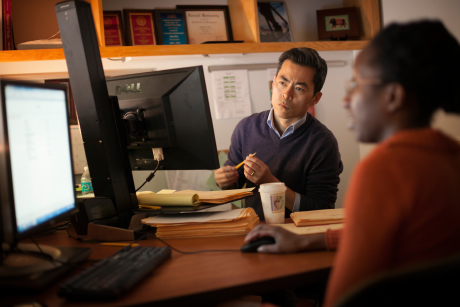In Arts and Sciences, reading every admission application
By Kathy Hovis

Google “Ivy League admissions” and up will pop thousands of sites that list the GPA requirements, SAT scores and activities a high school student needs to make her or his application stand out to admissions counselors.
Typical text reads: “A winning Ivy League application needs to present a strong academic record, meaningful extracurricular activities, glowing letters of recommendation and a compelling application essay.”
What these sites don’t reveal are a host of other factors that Cornell’s admissions deans consider when they are deciding on the new freshman class. Things like curiosity, sincerity, leadership and a general sense that they will “fit” at Cornell – the idea that students understand and are excited to take advantage of all that Cornell has to offer.
At the College of Arts and Sciences, 12 full-time advising deans join forces with nearly 50 faculty readers to review each application.
A thorough process
Just as students weigh a host of factors when choosing a college, admissions deans look way beyond SAT scores and high school transcripts when making decisions.
“Sometimes people think there’s some exact formula that will get you in,” said David DeVries, associate dean of undergraduate education in the College of Arts and Sciences. “There’s a false sense of security in high SAT scores and a high GPA.”
“We are looking for students who would benefit from what this place has to offer,” he said. “And also for students who have thought about Cornell and have imagined the possibilities here for them.”
In the College of Arts and Sciences, 18,592 students applied for admission to the Class of 2018. Each of those applications were read through, not summarily rejected because of less-than-perfect grades or test scores.
Carl Franck, professor of physics, has been reviewing applications for 20 years. “It’s amazing how qualified all of these kids are,” Franck said. “The process is much more competitive.”
Each spring since the 1970s, Arts and Sciences faculty have joined advising deans in reviewing applications, sorting applicants into “accepted,” “not accepted” or “maybe” piles.
“The features that help make a student successful in a college as complex as ours are also very complex,” said faculty reader Robin McNeal, associate professor in the Department of Asian Studies. “There isn’t one set of numbers or one set of tests that can indicate if a student has the diverse critical thinking skills, the creativity, the willingness to be engaged while here – all things that I think are important in making a successful student.”
“Faculty are in the classroom, they’ve worked with a range of students, so their input helps inform our process,” said Ray Kim, assistant dean for admissions and advising. “And the faculty say it helps them to understand what high school students are going through and the state they’re in when they get here.”
Walker White, a lecturer in computer science and director of the Game Design Initiative at Cornell, said faculty readers help determine whether a student is prepared to pursue a specific interest at Cornell.
“Computer science is an elective that is not available at most high schools, so how can you tell whether a student is prepared or not?,” White said. “Faculty members like myself are pretty good at this.”
Every application reviewed
On a typical brisk February morning, Kim and Jamila Michener, assistant professor of government, sit in Kim’s office with a stack of yellow forms used to evaluate an applicant’s qualifications.
They are looking at an applicant we’ll call Chad, his recommendation letters, counselor reports, what he’s done to explore his interests, special achievements, competitions, “indicators that he’s achieved at a very high level,” Kim said.
Chad’s essay is well-written, but it doesn’t mention Cornell until the end. “This seems like it could have been written and used as a supplement for any school,” Michener said. Chad ends up in the “maybe” pile.
Kim said students shouldn’t worry if they want to be humorous or show a little spunk. He said the best essays use natural language and show personality. “I know you’re a serious student from your curricular choices and your test scores, but what about you?” Kim said.
Kim said his favorite essay from last year was about lint, and another came from a student who failed her driver’s test four times because she wanted to pass it driving a stick shift.
“I enjoy finding that needle in the haystack of the students who are truly thinking for themselves, writing from their own experience, and who have something interesting to bring to the table,” said Kathleen Perry Long, a professor of French in the Department of Romance Studies, about the careful reading required of faculty and staff. “But there is a lot of haystack…”
McNeal said he’s met some of the students that he’s admitted and taken on a few as first-year advisees.
“In none of these cases could I (or anyone else, I suspect, including the students themselves) have predicted precisely the path that these students were going to take,” he said. “All I could say at the time was, ‘I think this student’s journey is going to be a great one, and I think Cornell is the right place for that journey to begin.’”
Kathy Hovis is a staff writer for the College of Arts and Sciences.
Media Contact
Get Cornell news delivered right to your inbox.
Subscribe